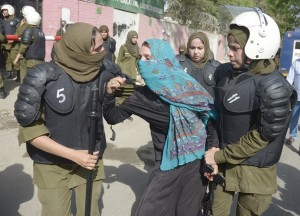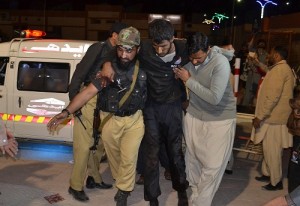Tentative Regulatory Impact Assessment of
the Police Order, 2002
Kamran Adil
The European Union started using the technique of Regulatory Impact Assessment (RIA) with regards to the proposed and current legislation. The International Association of Impact Assessment defines ‘Impact Assessment’ as ‘the process of identifying the future consequences of a current or proposed action’. There is no tradition or requirement of getting RIA of legislative initiatives in Pakistan leading to speculation of personalized opinions about a piece of legislation by different stakeholders. The Police Order, 2002, like many other legislative initiatives, often is either eulogized and portrayed as a panacea to all ills or is opposed on petty turf considerations. There is knowledge gap insofar as the actual state of affairs is concerned, which will be discussed here in a tentative manner. The assessment is being presented thematically in this write-up:
- Keeping in view the difference between the concepts of ‘policing’ and ‘police’, it may be noted that the Police Order, 2002, addressed ‘police’ part of the reforms that focused on police organization and its allied matters. The broader ‘policing’ changes affecting powers of policing like the registration of criminal cases, collection of evidence, investigation, search, seizure, power to arrest, bail, remand and matters of similar nature are yet to be undertaken.
- While the Police Order, 2002, never got implemented fully since its promulgation, the original law was substantially amended by the Police Order (Amendment) Ordinance, 2005, affecting 54 of its provisions. Mostly, these amendments took away much of the independent institutional framework related prowess of the law.
- The Police Order was never implemented in Islamabad Capital Territory. After the Eighteenth Amendment, in total disregard to Articles 142 and 143 of the Constitution and latest judgements of the superior courts, the concurrent character of the police law was substituted with exclusive domain interpretation by the provinces culminating into provincial police laws.
A brief overview of the impact of different provisions of the Police Order is noted hereunder:
- The law, for the first time, through its following preamble linked Police to people. Expressing the intent of the legislature, specific recitals talked about the rule of law and required Police to be professional, service-oriented and accountable towards people. This was in total contradiction to the Police Act, 1861, that projected Police as an ‘instrument’ in the hands of colonial masters;
- The general duties of Police towards citizens, women, children and elderly were outlined in detail in Articles 2, 3 and 4;
- To legally block politically motivated lateral entry into police organization, Article 7 defined levels of entry into Police;
- Envisaging functional specialization in Police, Article 8 provided for its legal basis enabling police leadership to move cases for requesting allocation of a dedicated budget for functional components;
- Based on the model of squaring authority with responsibility, Article 11 provided powers of ex-officio Secretary to the Inspector General of Police. The powers were supplemented with powers to issue orders (Standing Orders/Standard Operating Procedures) that could shape the daily working of Police. Contrary to these unshackled powers, Section 12 of the Police Act of 1861 made the approval of the provincial government conditional for issuance of any such order. Article 11 did not witness full fruition and remained partially applicable;
- Article 12 provided for tenure protection of police officers working at different institutional assignments;
- Article 18-A froze the number of investigations and institutionalized decision-making process of change of investigation. Previously, the investigations were perpetual and criminal cases were used for political purposes as these could be re-opened arbitrarily;
- Article 24 required oath-taking for Police officers and established ethical relationship with the professionalism;
- Article 25 provided categories of junior and senior police ranks as compared to colonial jargon of upper and lower subordinate rank structure;
- Chapter IV linked Police to local government. It was a significant way forward from the colonial Police Act, 1861;
- Chapters V, VI, VII, VIII and IX linked Police to democratic oversight by elected people. Unfortunately, all the institutional mechanism has been made dysfunctional;
- Chapter X established a neutral and powerful complaints authority for accountability of Police;
- Chapter XI envisaged a Criminal Justice Coordination Committee mechanism, which was unique as it brought all criminal justice system’s components together. Even District Public Prosecutors (DPPs) happily joined it as it provided a platform under the leadership of Sessions Judge where criminal justice system could be steered in one direction, and the culture of cross-purpose working could be undone;
- Article 114 provided for the Code of Conduct for police officers in line with the best international practices;
- Chapters XIII and XIV granted powers to Head of District Police to effectively manage public order situations. Even lockdowns in Post-Covid situation could be ordered under these provisions. Also, these powers provided for regulating activities in the area of Police that could ensure order and security in the society. It could be a beneficial alternative to omnibus 144 Cr. P. C.;
- Chapter XV had addressed the gap in the legal framework to deal with unclaimed property. An advantageous procedural mechanism has been provided that is used by professional police officers to facilitate the public at large;
- Chapter XVII criminalized police misconduct and excesses. Contrary to general perception, it even criminalized police torture in Article 156(d);
- Chapter XVIII provided for National Police Management Board, a body of police leadership to take strategic decisions with uniform features and standards for all police organizations of the country;

- Article 162 provided statutory cover to the National Police Bureau, which should be acting as research and analysis wing with centralized databases and national forensic agency under its control;
- Article 163 provided a legal basis to enter into international cooperation with international organizations;
- Article 166 dealt with crime statistics collection, collation and recording in an institutionalized manner. Earlier, there was no legal framework to cover this aspect of police administration;
- Article 168 catered for the need to establish Police Citizen Liaison Committees. In line with the best international practices, it was conceived as part of community policing initiatives;
- Article 169 established Public Safety Fund with provision to credit sums from traffic fines’ collection with specific objectives to improve service delivery by Police. It was to be a non-lapsable account. Unfortunately, the provision was never implemented;
- Article 171 introduced bona fide doctrine as a defence to official actions;
- Articles 174 to 181 provide for the power to issue licences and their regulation concerning public order;
The above points must be gauged on their merit. There is no cavil to the proposition that the Police Order, 2002, was wholesome legislation on ‘police’; timely reforms on ‘policing’ could have brought about a qualitative change in the overall functioning of the Police. Nonetheless, it did provide many groundbreaking ideas that set the direction for the future of Police and policing in Pakistan.
 Jahangir's World Times First Comprehensive Magazine for students/teachers of competitive exams and general readers as well.
Jahangir's World Times First Comprehensive Magazine for students/teachers of competitive exams and general readers as well.




